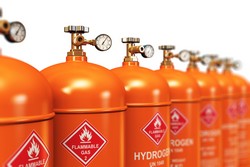Metal hydrides for hydrogen storage and hydrogen compression
The researchers working on the ATLAS-H2 (Advanced metal hydride tanks for integrated hydrogen applications) project developed tank systems for solid-state storage of hydrogen and hydrogen compression. Various metal alloys and intermetallics react with hydrogen, forming metal hydrides. By controlling temperature and pressure appropriately, the direction of the chemical reaction can be adjusted. In other words, metals can be charged and discharged with hydrogen. The development of a hydrogen storage tank based on metal hydrides involved different levels of research. First, different types of hydrogen storage materials were synthesised, screened and evaluated at laboratory scale taking in account the foreseen applications (hydrogen storage and compression): Mg-based and AB2 / AB5 types (e.g. the La1-xCexNi5 system). Among all the metal hydrides tested for hydrogen storage, just a few of them were chosen to develop a full-scale tank system. The prototype system incorporates discs of compacted magnesium hydride and a phase-change material to store the heat released during hydrogen absorption for reuse during desorption. A series of hydrogen absorption and desorption tests were carried out to assess the performance of the Mg-based hydrogen storage tank. A proton exchange membrane fuel cell delivering electrical power of 1.2 kilowatts was used to test the ability of the tank to supply the required hydrogen flow rate for its operation. ATLAS-H2 technology for storing hydrogen in metal hydrides at low pressure addresses a host of potential industrially relevant applications related to renewable energy. Not surprisingly, this hydrogen storage tank technology has already moved to commercialisation phase. On the other hand, construction of a lab-scale, multi-stage Metal Hydride based Hydrogen Compressor with H2 delivery pressure above 200 bar has been successfully demonstrated in the context of ATLAS-H2. The H2 compressor uses only hot and cold water for its operation and the flow rate of the device is around 2000 litres of H2 per hour. Currently, a follow-up action is being implemented, aiming to up-scale the laboratory prototype metal-hydride compressor (MHC) developed under ATLAS-H2, to evaluate the technology in a complete renewable energy (RE) storage system and to assess the current market for metal-hydride compressors especially in RE storage applications.
Keywords
Metal hydrides, hydrogen storage, fuel cell, ATLAS-H2, tank system, magnesium hydride, phase-change material

